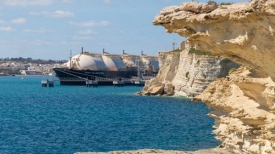Malta’s sole power link to Europe feels the strain

31 January 2018, 08:54
Tags: cable
Energy security is an increasingly hot topic in Malta. Imported electricity prices increased last year and Valetta had to rely more and more on the sole undersea cable that links it to the European grid via Sicily.
Malta is one of the least connected countries in the entire EU and relies on LNG imports and a single electricity cable linking it to Italy for its external power supplies.
That isolation is costing the island nation dear. Its energy minister, Joe Mizzi, revealed last week in the Maltese parliament that the price of electricity provided by the interconnector rose by 25% last year compared with 2016.
Official statistics show that Malta relied on the interconnector for 47% of electricity in 2015, the year it was commissioned, and the figure rose to 68% in 2016.
Although he refused to give specific price information due to “commercial considerations”, Mizzi added that Malta took delivery of nine LNG shipments since November 2016 in order to meet its energy needs.
Malta’s new €450 million gas-fired power plant. The Times of Malta reported that it has a number of faults that have caused inefficiencies, according to the chairman of the island’s main electricity supplier, Enemalta.
But Prime Minister Joseph Muscat is a supporter of the plant and in December said that “without the new power plant, we would have been 24MW short, meaning an area the size of [the island of] Gozo would have been blacked out”.
Enemalta is committed to buying energy from the new gas power plant, operated by Electrogas, a local energy firm, for an 18-year period, under a government contract.
In order to improve its energy security, Malta is hoping that work will proceed on a gas pipeline connecting it with Italy, which has been marked as a project of common interest (PCI) by the European Commission.
The project, which has a budget of €322 million, is still in the planning phase and permits are scheduled to be issued in 2020. Before that can happen, EU-funded environmental impact studies, costing around €8 million, will have to be carried out. A completion date of the entire pipeline has been tentatively set for 2024.
The Commission’s new PCI list will this week be scrutinised by MEPs on the Parliament’s energy committee.
Green campaigners have criticised the updated list of projects for focusing too heavily on natural gas pipelines, although the Commission insists that it has prioritised electricity interconnectors, in line with the climate goals of the Paris Agreement and the targets of the Energy Union itself.




 Previous
Previous